|
|
|
Sort Order |
|
|
|
Items / Page
|
|
|
|
|
|
|
| Srl | Item |
| 1 |
ID:
139172
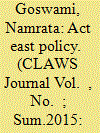

|
|
|
|
|
| Summary/Abstract |
For many years now, since 1992, when it laid its seed and slowly gathered momentum in policy circles, the “Look East” policy has been oft repeated in New Delhi’s strategic and policy circles as one of India’s foremost long-term policy visions to open up its economy for investment and trade with Southeast Asia. Increasingly now, the reference has changed from “Looking East” to “Acting East” by which one would expect that the policy is in its implementation phase. In augmenting the “Act East” policy, the northeast of India emerges, by the criterion of geography, as the region which will act as the ‘strategic catalyst’ or ‘game changer’ in accomplishing the vision that the policy aspires to embolden. Situated between China, Bhutan, Bangladesh, and Myanmar and with an international border stretching up to 4, 500 km, the region has held the promise of acting as a bridge between India and Southeast Asia for years. Its history vindicates such a role as its people have traded and travelled across the Southeast Asian region and Yunnan for years through the ancient Silk Road, trading in Himalayan salt, spices, handicrafts, food items, silk and other goods. This region witnessed migration of people from Southeast Asia and Yunnan to Assam and its surrounding hills, the most prominent being the Ahoms tracing their roots to the Tai race in Yunnan and Thailand. The Ahoms led by Sukapha arrived in Assam in
1228 A.D. and ruled over this region for 600 years. It is significant to note that the Ahoms under Lachit Borphukan successfully prevented Mughal expansion into Assam by defeating the Mughal Army in the much revered Battle of Saraighat of 1671.1
|
|
|
|
|
|
|
|
|
|
|
|
|
|
|
|
| 2 |
ID:
124482


|
|
|
|
|
| Publication |
2013.
|
| Summary/Abstract |
This article explores the political subjectivity of Kurdish children in urban Turkey. Often referred to as "stone-throwing children," since the early 2000s Kurdish children have entered Turkish public discourse as central political actors of the urban Kurdish movement. I suggest that the politicization of children can be understood in the context of transformations in age and kinship systems within the Kurdish community that were shaped by the forced migration of Kurds in the early 1990s. Focusing on the experiences of Kurdish children in the city of Adana, I argue that memories of violence transmitted by displaced parents, combined with the children's experiences of urban life, including exclusion, discrimination, poverty, and state violence, necessitate a reevaluation of how childhood is conceived and experienced within the Kurdish community. In a context where Kurdish adults often have trouble integrating into the urban context, their children frequently challenge conventional power relations within their families as well as within the Kurdish movement. In contrast to a dominant Turkish public discourse positing that these children are being abused by politicized adults, I contend that Kurdish children are active agents who subvert the agendas and norms of not only Turkish but also Kurdish politics. The article analyzes the ways Kurdish children are represented in the public discourse, how they narrate and make sense of their own politicization, and the relationship between the memory and the postmemory of violence in the context of their mobilization.
|
|
|
|
|
|
|
|
|
|
|
|
|
|
|
|
| 3 |
ID:
126411
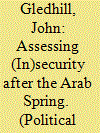

|
|
|
|
|
| Publication |
2013.
|
| Summary/Abstract |
More than two years after the heady days of protest and uprising that characterized the Arab Spring, the glow of revolution has given way to the intricacies and complications of regime building. Coalitions are being formed, constitutions written, judiciaries vetted, and security services (re)built. As collective attention focuses on these complexities of regime restructuring, it is worth noting that a fundamental security paradox sits at the heart of transitions in the Middle East and North Africa. On one hand, individuals who hit the streets or battlefields in support of revolution in 2011 did so in the belief that a new form of government would improve their political, social, and economic security over the long term. On the other hand, subsequent (and ongoing) efforts to draft new rules of the political game have triggered internal conflicts and, on occasion, those conflicts have compromised citizens' physical security over the short term.
|
|
|
|
|
|
|
|
|
|
|
|
|
|
|
|
| 4 |
ID:
133850
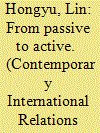

|
|
|
|
|
| Publication |
2014.
|
| Summary/Abstract |
As one of the victorious allies of World War - I, China attended the Paris Peace Conference in 1919. Toa certain extent, the conference can be regarded as the true beginning of global governance. It was followed by the establishment of the Versailles-Washington System. The first international pattern with world participation
|
|
|
|
|
|
|
|
|
|
|
|
|
|
|
|
| 5 |
ID:
116221
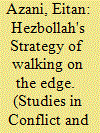

|
|
|
|
|
| Publication |
2012.
|
| Summary/Abstract |
Since entering Lebanese politics in the 1990s, Hezbollah has defined itself as a political party that plays by the rules. Simultaneously, it has continued to use social assistance to win over Lebanon's Shi'ites while using violence to eliminate rivals. Through this strategy of "walking on the edge," Hezbollah has metamorphosed from an illegitimate terrorist organization into a legitimate political party heading Lebanon's government. An International Tribunal's recent indictment of four senior Hezbollah officials for involvement in the murder of former Lebanese Prime Minister Rafiq Al-Hariri provides an opportunity to understand how Hezbollah maintains this canny-and successful-balancing act.
|
|
|
|
|
|
|
|
|
|
|
|
|
|
|
|
| 6 |
ID:
133770
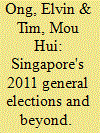

|
|
|
|
|
| Publication |
2014.
|
| Summary/Abstract |
We introduce the concept of a "credibility gap" to explain why the Workers' Party has been more successful than other opposition political parties in recent elections in Singapore. We argue that opposition parties need to overcome a credible commitment problem with the electorate in order to win against hegemonic parties.
|
|
|
|
|
|
|
|
|
|
|
|
|
|
|
|
|
|
|
|
|